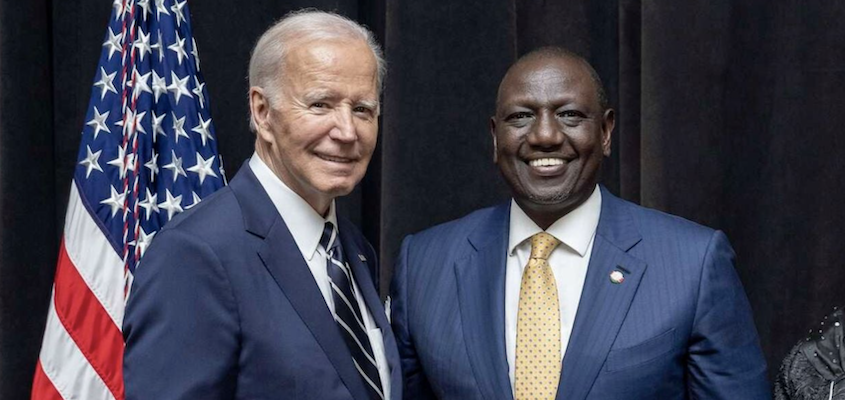AG: This week Haitian Americans demonstrated outside the Kenyan Embassy in the US chanting “Still a Slave” in reference to Ruto. Do the tiny minority who oppose the deployment visibly protest there in Kenya?
WS: Protest of foreign policy is not something that happens here, not only because the population is disengaged, but also because it’s not safe. Our constitution guarantees freedom of assembly, but that doesn’t mean it’s a reality, and Kenyan police are very brutal. I think that’s one reason they’ve been chosen for this deployment.
AG: I know the story of Dr. Abdiwahab Sheikh Abdisamad, who was kidnapped off the streets in Nairobi, held in captivity for 10 days, then unceremoniously dumped back on the streets.
WS: Yes, that’s an example of how Kenyan police operate beyond the law with impunity.
AG: What about the High Court of Kenya, which
ruled in January that the deployment to Haiti violated the Kenyan Constitution? Isn’t President Ruto violating the court’s ruling?
WS: Yes, but no one will do anything about that.
AG: So the apparatus of force will not uphold the law if the executive refuses to?
WS: That’s right. Like you, we have three branches of government—the executive, legislative, and judiciary—but in fact the executive holds most of the power.
AG: So Ruto is just blowing off your Constitution and High Court to deploy these troops to Haiti?
WS: Yes.
AG: While the US lauds Kenya as a tranquil bastion of liberal democracy.
WS: Exactly. And Kenya’s subservience is especially important to the West now that it’s being kicked out of the Sahel nations.
AG: Hasn’t Kenyan politician Ekuru Aukot gone to court to demand that the ruling be respected? He’s
told the press that the agreement between President Ruto and Haitian Prime Minister Ariel Henry was invalid, and Ariel Henry isn’t even the prime minister anymore.
WS: Ekuru Aukot can go to court all he wants, and that will at least generate headlines, educate, and make his point, but ultimately Ruto will ignore the results and do what he wants. He and the US have made too great an investment in this to back down, and neither have a political constituency that will force them to.
Kenyan police will go to Haiti, and if the violence leads to some coming home in body bags, Ruto will describe them as heroes who died for a Pan-African cause.
AG: Isn’t there some complaint that Kenya has problems at home, particularly in its northern districts, that its police should address before going overseas? I believe that a reporter for your leading television outlet
questioned Ruto about this at a press conference while he was here.
WS: That’s true, and there are problems in the northern district that Ekuru Aukot hails from, but in the end, again, Ruto and the US will both do what they want.
AG: Those Kenyan police will get paid a lot more serving in this US-led force in Haiti than they could get paid at home. Ths same has been true of African troops who served in Iraq and Afghanistan or who now serve with AFRICOM or in various “peacekeeping” deployments, like those in Somalia, which include Kenyans, or like the Rwandan deployment to protect TotalEnergies’ interests in Mozambique. Isn’t this likely to create a self-interested constituency in support of the deployment, as it has in these other instances?
WS: That’s quite likely.
AG: Has African Stream been in touch with the resistance on the ground in Haiti?
WS: Yes, we interviewed grassroots organizers with
MOLEGHAF , the National Movement for Liberty and Equality of Haitians for Fraternity, and we are staying in touch. The main thing we can do right now is to keep talking about this so that it doesn’t all take place in darkness.
AG: William, thank you for speaking to
Black Agenda Report.
WS: You’re welcome.





